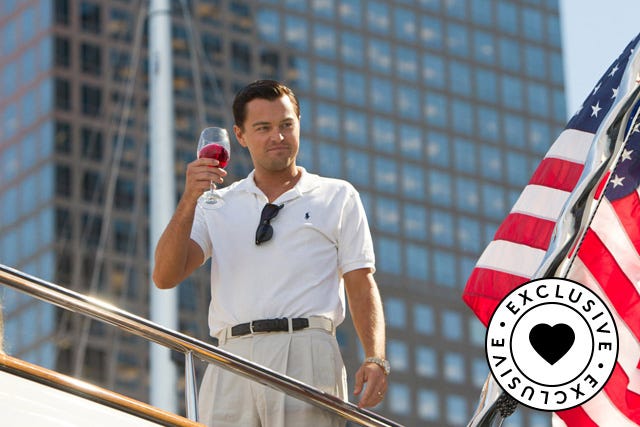 Photo: Courtesy of Paramount Pictures.
Photo: Courtesy of Paramount Pictures.
Back in the '90s, when Leo was still in his post-Titanic days, a young Wall Street broker, Jordan Belfort, was living the life of a modern-day Caligula. Since then, Leo’s cleaned up his act a bit, and so has Belfort, whose memoir, The Wolf of Wall Street, was the inspiration for the actor's latest movie, costarring Jonah Hill and directed by Martin Scorsese.
Leo’s on a wildly successful run. Last year, he earned an Oscar nod for his villainous portrayal of a slave owner in Django Unchained, and then played the eponymous lead in one of the year's most talked-about films, The Great Gatsby. Wolf already has two Golden Globe nominations, including a Best Actor nod for the leading man.
AdvertisementADVERTISEMENT
He sat down with R29 recently, to talk about Wall Street debauchery, fake cocaine, and studying the "drunkest man in the world." As you might expect, things got pretty interesting.
You’re walking with a cane today, and we wondered if it was for a role...
“The cane is because I sprained my ankle on a floorboard. Nothing as exciting as maybe you hoped it would be. But yes, look, my attitude about doing this movie is that we were trying to depict a modern-day Caligula and all the debauchery that comes with it. So, you detach yourself from your own individuality for the accurate portrayal of a character. That’s what we do, so all the stuff that came with it, you know, it was a fun process because there were really no limits to what we could do.”
Of course, it’s not really cocaine in the movie, so what are you actually using?
“They were baby vitamins. Vitamin B. It certainly burned our noses and we were energized for the day.”
Why do you think audiences love these characters? Do you think it’s because we’re a depraved society?
“Some of my favorite films of all time have been a reflection of the darker side of human nature. In a way, those films are an accurate portrayal of humanity, not all humanity, but a facet of who we are today. I wanted to do a film that, to me, was a depiction of what I felt like are the times that we live in. It’s something I just felt compelled to play. I think it’s important to do films like this, ultimately.”
AdvertisementADVERTISEMENT
What was the most important thing you learned from Jordan Belfort? Do you have empathy or sympathy for him now?
“He was incredibly beneficial for me as an actor. He would divulge the most embarrassing things about his life because he looked at it as a part of his past. Even times where we’d start to have conversations and he’d start to veer off into, ‘Well, maybe we shouldn’t portray…’ I’d say, ‘Look, you wrote this book about what happened behind the doors of Wall Street and the conversations that were going on in an unregulated marketplace. You’re making a statement here, so let’s tell the truth.’ As soon as we had that conversation, he was like, ‘All right, I’m an open book. I’m gonna tell you not only what happened on that day, I’m gonna tell you something that was ten times worse.”
One of the funniest scenes is the Quaaludes overdose.
“We wanted it to be this hallucinogenic ride, this rollercoaster, and that sequence specifically was like a day in the life of two schnooks that took way too many drugs. To me, it was almost like a small film within the film and we kind of treated it that way.”
"A lot of it came from me really filming Jordan, talking to me about what Quaaludes were like. I had him rolling around on the floor for me and he was very helpful with that, but a lot of the research that I did really came from watching this one video on loop. It’s on YouTube, it’s called “The Drunkest Man In The World” and it’s a man trying to get a beer, but he’s rolling around the floor for hours. That was a huge inspiration for me.”
How would you characterize your relationship with Scorsese? Brotherly, friendly, or father-son?
“With Gangs of New York, I’d been wanting to work with this man for a long period of time. I remember my father taking me to see one of Marty’s movies and saying, ‘If you have an opportunity and if you have a green light in this industry, there’s one person you should work with – this man.’ I sought out trying to work with him and it culminated in Gangs of New York. Since then, it’s been this great relationship where we’ve trusted each other more and more. We’ve realized we have a lot of similar sensibilities in the types of movies that we want to do and we have an acute understanding for what a scene should be. More than that, everyday for me, it’s just an honor to be on set with somebody like this. He reinforces in you what making movies is all about. Sometimes you forget.”